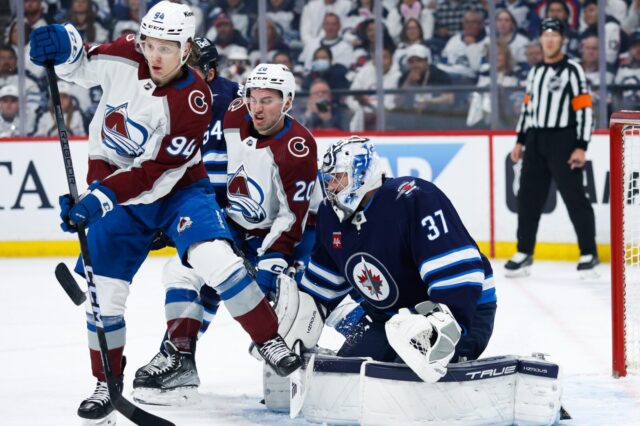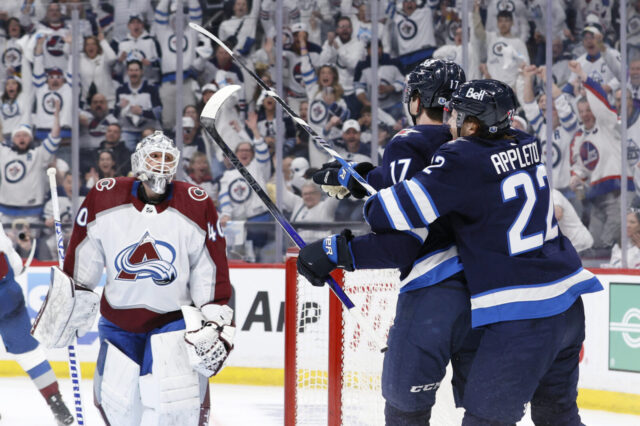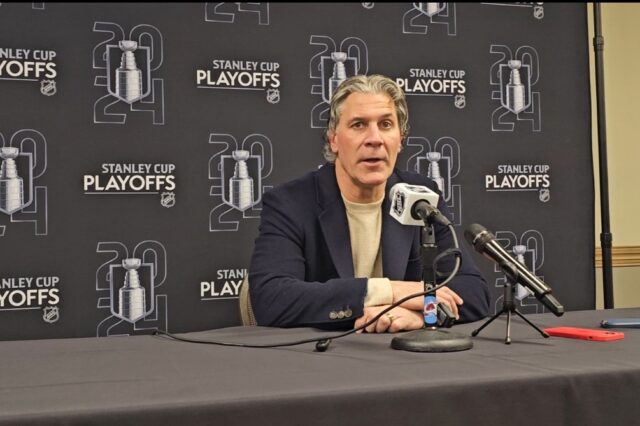With three goals and five assists through 31 games played, it wouldn’t appear as though Nikita Zadorov is playing stellar hockey right now, especially when compared to the offensive production from teammate Tyson Barrie this season. But the truth is that — after a slow start — Zadorov has been playing some of his best hockey since arriving in Denver.
The 22-year-old defenseman is currently second on the team in Corsi-for percentage, shooting the puck at a rate we have never seen from him before, and assuming he stays healthy, he is on pace to play the most minutes of his career by kilometers.
“I’m not really looking at those stats,” Zadorov said. “You guys probably know more than me. I’m just trying to do my best to help my team win.”
Well, he’s right: we do know more about his stats than he does.
To go along with his 50.64 Corsi-for percentage, which is behind only Mikko Rantanen, Zadorov has been shooting the puck at a rate of 13.39 shot attempts per 60 minutes in five-on-five play so far this season, a career-high. Last year, as a comparison, Zadorov shot at a rate of 9.36 shot attempts per 60.
“Maybe because I’m playing with our top players? I’m playing with [Nathan MacKinnon’s] line all the time, so we are getting more opportunity offensively,” Zadorov suggested. “Just me and [Erik Johnson], we are getting back defensively and that’s what’s helping us overall.”
Zadorov and Johnson have been a formidable defensive pairing for quite some time, but this season, since they have both remained healthy, they have been the epitome of a shutdown defensive unit, combining for 112 blocked shots and 143 hits.
While Zadorov is helping push the pace of play and being a big part of the offense, one would assume he would have a few more goals. While he’s already at a career-high of three goals on the season, he has hit many crossbars and posts, had some goals retracted and some taken by teammates when Zadorov hits them in front of the net. (Normally, the vernacular would be ‘his teammates tipping his shots in front of the net’, but Zadorov’s shot is too hard to keep an eye on. His teammates just pray for a redirection and that he keeps the shot low.)
However, despite having a major hand in helping the Avalanche generate offense this season, goal scoring isn’t necessarily what Zadorov gets paid to do, so the fact that he deserves more goals on his stat page isn’t at the front of his mind. It can be hard to tell the difference between the offense and defense in hockey, but learning more about hockey positions can help clear up the difference.
“I’m not really thinking about it,” Zadorov said, on if he feels he should have a higher goal-count this season. “When I have a chance, I am trying to score, for sure — and then hopefully my partners keep making good plays for me, so I can get more chances.”
The Avalanche’s penalty-kill has been one of its biggest assets this year, currently ranking seventh in the league. Zadorov has been a big part of the penalty kill and its success, logging the third-most minutes while shorthanded on the Avalanche this season.
Once more, Zadorov passes off the credit to his forwards. “It’s a big responsibility for us. The guys go out there and compete, we all take it very serious — all units. Our forwards do a good job like [Blake Comeau], [Matt Nieto] and [Carl Soderberg]; they have been great.”
“We know it’s a big part of our team. If we kill those penalties, we know there’s a good chance we’re going to win the hockey game, so we just go out there and compete.”
Zadorov has been playing the best hockey of his career amidst the constant chaos of Colorado’s defensive carousel; one that’s spun all year long. The Avalanche have used ten different defensemen this season and seemingly a different six, or sometimes seven, almost every game.
Of course, being the professional that he is, Zadorov plays it off like it’s no big thing.
“We all know each other; it’s not a big difference. Obviously, it’s harder when you are switching lefty or righty all of the time — maybe this is where you have to adjust a little bit — but with our system and our communication on the ice, all the boys helping each other calling for the pucks and everything, it doesn’t matter.”



